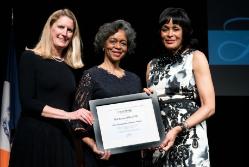"Around the College" is no longer being updated.
View current SUNY Empire Stories.
February 17, 2017
Nell Braxton Gibson ’82, Among ‘60s Civil Rights Pioneers Interviewed on “Full Frontal with Samantha Bee” for Black History Month

Alumna Nell Braxton Gibson ’82 is among the 60’s civil rights pioneers featured on “Full Frontal with Samantha Bee.”
Full Frontal reporter Ashley Nicole Black’s story about Black History Month and the 60’s civil rights movement sheds light on the hard, day-to-day work required to picket locally, march nationally and increase voter registration.
“Well I do remember being literally bone tired,” said Gibson. “Exhausting work. It wasn't the kind of thing where I showed up one day and said I want to go picket, we went through all of these rules and regulations.”
A 2016 recipient of the college’s Distinguished Alumna Award, Gibson’s award citation reads: “For her advocacy, activism and giving a voice to the powerless, SUNY Empire State College is proud to call Nell Braxton Gibson a most distinguished alumna.”
In discussing how to bring about real and lasting change, she said, “It’s those little marches that happen the day after, and the day after that and the day after that.”
Increasing the number of African-Americans registered to vote was an important goal, and was a particular time-consuming challenge, “Some people just slammed the door in our faces and want to talk,” said Gibson. “Some were elderly people who were terrified. You might spend all the time that afternoon talking to one old lady saying, ‘Really we'll be with you. We'll hold your hand, we will make sure you get down there.’”
She also shared advice for those not currently involved with civil rights who may not want to get outside of themselves and talk with others: “Suck it up. It’s too important not to (do).
Black’s complete story on Full Frontal can be viewed online.
About Nell Braxton Gibson ’82, Bachelor of Arts in Cultural Studies
Gibson’s efforts to break down racial barriers also took her to Africa during the mid-1960s. She was later arrested in 1987, while protesting apartheid in front of the South African Consulate.
Her efforts caught the attention of Desmond Tutu, the former archbishop of Cape Town, South Africa. Tutu appointed her as a member of his steering committee of international religious leaders, who helped design a five-year plan to dismantle apartheid.
Today she continues her role as a community activist.
Born in the South to professional educators, Gibson grew up on black college campuses in Texas, Florida and Mississippi.
Activists in the 1950s, her parents became close friends with civil rights champions Mary McLeod Bethune and Medgar Evers and worked with them on increasing membership in the Mississippi NAACP.
In 1962, Gibson herself became part of the country's growing civil rights movement, when she and fellow students began walking on picket lines, participating in mass demonstrations and registering first-time black voters and were arrested for protesting segregated hearings at the Georgia State Capitol.
Gibson's personal commitment to justice led her to the international stage. She traveled to Africa in support of newly independent African nations, befriended and sheltered members of the exiled South African community and spoke out against the atrocities she witnessed in Tanzania and Namibia.
Back at home, her dedication to her cause led her to join her local church's Black and Brown Caucus. She also joined members of the Interfaith Council for Corporate Responsibility in its work to dismantle apartheid in South Africa.
Gibson was the first woman to serve on the board of trustees at Berkeley Divinity School at Yale University, which awarded her an honorary Doctor of Divinity.
She has been honored by the National Union of Black Episcopalians, the Manhattan Country School, the Episcopal Church's House of Deputies and received a Trinity Transformational Fellowship.
She is the former chair of the New York Diocesan Committee on Reparations for Slavery and a past coordinator of the Episcopal Urban Caucus, a social-justice organization whose mission is to stand in solidarity with poor and oppressed people.
Gibson and her husband, Bert, are the parents of a daughter, Ericka, the first African-American board-certified veterinary neurosurgeon.
